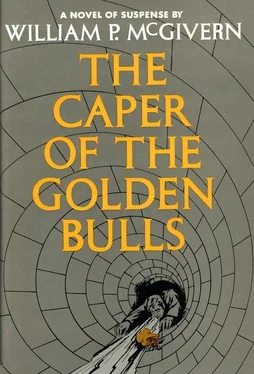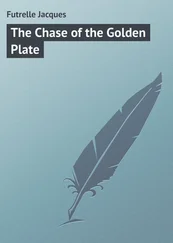The grille work inclined towards the wall of the building at a forty-five degree angle. Peter sliced it from its frame in a single piece, and smeared the shiny cuts with black grease. The grille work angled to the wall as it was, could be replaced in its frame as neatly and firmly as a lid on a pot. Peter set it aside and drew a line on the bottom of a window-pane with a glass cutter. He covered this with transparent tape, and made three more incisions on the top and sides of the glass. When he gently prodded the pane with his fingertip, it fell open like a trap door, hinged by the strip of transparent tape. Peter put a hand through the window, found the catch and released it. He then replaced the pane of glass and secured it firmly with three more strips of tape. It would have required a close examination to reveal that the window had been tampered with. The work had taken sixty-five seconds.
Boots rang in the plaza. Someone hailed Francois. Peter froze against the wall.
“Yes, yes, I do need a room,” he heard Francois say, in a much too hearty voice.
Peter crept up the passage and peered into the plaza. Francois was talking to a policeman.
“In that case, I’ll take you to my brother’s home,” the policeman said. “It’s only a cot, but you’re lucky to find anything now. And it’s not expensive.”
“But I’m waiting for friends.”
“Here? At this hour?”
“They’re driving up from Madrid.”
“Oh. Didn’t you come into the plaza with someone else? A tall man with a suitcase?”
“A tall man?” Francois laughed pointlessly. “Yes. He’s gone through. He’s got a girl in town.”
“Lucky fellow.”
The policeman went away, his boots ringing hollowly on the cobblestones. When the sound faded to a murmur, Francois wheeled and ducked into the passage alongside Peter. He was breathing hard; sweat beaded his forehead.
“Come on,” Peter said, moving off into the darkness...
The basement of the warehouse was immense. Peter stood behind the concealing bulk of a stone column and snapped on his flashlight. An irregularly pitched ceiling arched above them like the roof of a cave.
Peter’s torch formed a small pool of yellow light at his feet, and sent shadows leaping like phantoms towards the distant walls. The air was heavy and damp and motionless, like the air in a meat locker.
Peter took a compass from his pocket and turned the torch on it, and when the needle stopped flickering, he nodded to Francois, and followed the arrow through the darkness until he came to the wall that stood between him and the vaults of the bank. He checked his compass and studied the surface of the wall appraisingly. After a bit, he took out a crayon and drew on the dull-red bricks two black circles, three inches in diameter, three feet apart, and three feet above the floor.
He opened the suitcase, removed two hand-drills, gave one to Francois.
“Let’s go,” he said.
The drills dug and clawed with an angry sound at the stubborn bricks and mortar. Dust and powder rose and streaked their shining faces.
Church bells rang the quarter hours above the sleeping city, and from the streets came the voice of workers, faint and indistinct, and the thud of mallets on heavy timbers.
Francois leaned against the wall. Blood gleamed brightly from one of his knuckles.
“What is that?”
“The barricades. They’re putting them up.”
“Do we have enough time?”
“Yes. Keep drilling.”
“How much longer, for God’s sake? Look at my hands.”
“Keep drilling.”
Above them the city began to stir slowly and heavily, stretching itself like a great healthy animal. Water rumbled through the sewers beneath their feet, and there were muted sounds of traffic in the street. The gloom of the basement became streaked with slivers of pale light. “Good God, do we have time?”
“Yes.”
Peter knelt beside the suitcase to prepare his charges. But first he nibbled thoughtfully on a splinter of brick, attempting to learn something of its grain and porosity. He learned very little. The shot would be mainly guesswork, he knew, as he spat dust from his mouth and removed the blasting equipment from the suitcase.
Francois sucked blood from his damaged knuckles and watched him with anxious eyes.
Peter placed the blasting machine behind a stone column thirty feet from the wall. He unreeled fusing wire, measured it into forty-foot lengths, and cut each section carefully and squarely with a pen-knife. Using a hand-crimper he attached their ends snugly to electric detonator caps. He measured the length and diameter of the caps with his eyes. Two inches by a quarter-inch... He picked up a stick of dynamite and a: dynamite punch. Holding the dynamite in his left hand, he twisted the punch into the end of it with his other, driving the wooden pin deeply into the hard brittle explosive. Francois moved back. “You know what you’re doing?”
“Yes.”
When the holes were deep enough and wide enough, he screwed electric caps into them. He selected three sticks of dynamite for each charge, bound them together with friction tape, eased them carefully into the holes he and Francois had drilled into the wall. On top of the charges, he poured handfuls of loose brick and mortar; and pounded the mixture down hard with the flat of his hand.
Early light was spreading through the basement by then. Details emerged as the shadows shortened and retreated to the walls. There were empty packing cases, heaps of canvas hampers, a row of empty kegs, all of them covered with fine grey dust. There was only one door, and it was locked as Peter had surmised it would be from the opposite side.
It looked as if nothing short of dynamite would budge it; the panels were made of heavy slabs of hard wood, with massive iron hinges covering half their surfaces. “We have fifteen minutes,” Peter said.
He knelt behind the stone column, and examined the blasting machine.
Francois watched as Peter checked the plunger mechanism, the test pilot-light.
“You think it’s going to work?”
“Yes. There’ll be a heavy blast downward, a very little surface fragmentation. But cover your face, and stay behind the column. Now listen: We won’t have time to drill for the second shot. We’ll cover the dynamite with loose rock, as deep in the excavation as possible. Then we’ll stow this gear away and clear out of here. Fast.”
Francois studied Peter with a curious smile. The light in the basement was stronger and clearer now; it caught the flare of evil humour in his eyes, trapped that strange derisive spark that animated his commonplace features.
“And you’re doing all this for nothing,” he said, in a soft, musing voice. “For nothing but some crazy notion of honour. Tell me: what is honour? What’s it like?”
“It’s a good feeling.”
“Like the feeling after a fine dinner with excellent wines? Or like the feeling you have with a new and fascinating woman, someone sensual and experimental, who drives you as wild as salt in a fresh wound?”
Francois smiled delicately. “Is it a feeling like that?”
“No.”
“Then I can’t be missing very much.”
“Don’t knock it until you’ve tried it.”
“You’re a fool. I’ve found only one thing in life worth being loyal to, and that’s my own flesh and blood. In this world a man can only betray himself.” Francois smiled faintly. “So whatever you think, I’m no traitor. I always take good care of myself.”
Peter glanced at his watch.
“I’m boring you, eh?” There was a touch of bitterness in Francois’s tone. “You’re the dedicated hero, and I’m the tiresome weakling. Is that what you think?”
“Why worry about it? You say loyalty and heroism are accidents. You equate honour with a good meal and a roll in the hay. That’s a cosy philosophy. Cuddle up to it and make yourself comfortable.”
Читать дальше












